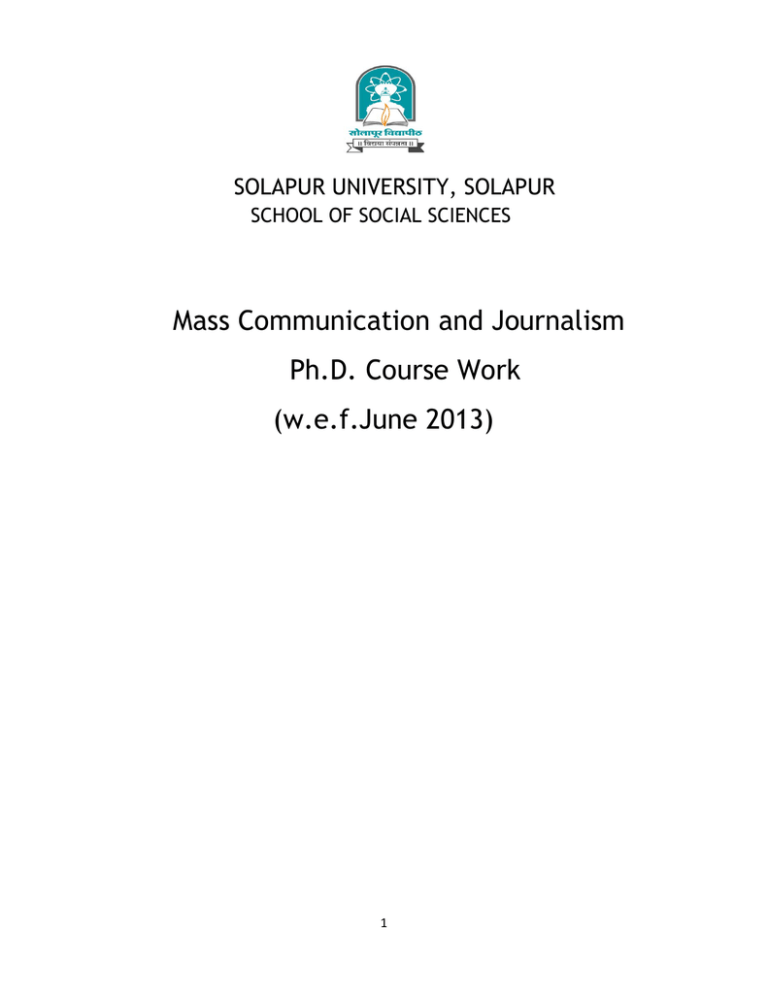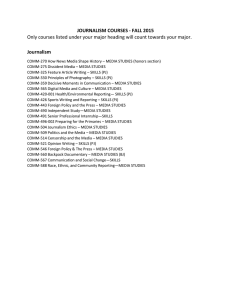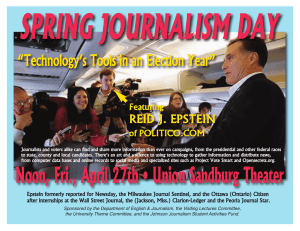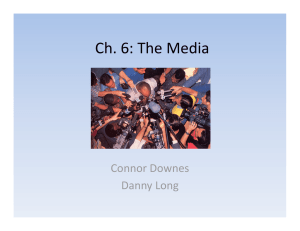Mass Communication and Journalism Ph.D. Course Work (w.e.f.June 2013) SOLAPUR UNIVERSITY, SOLAPUR
advertisement

SOLAPUR UNIVERSITY, SOLAPUR SCHOOL OF SOCIAL SCIENCES Mass Communication and Journalism Ph.D. Course Work (w.e.f.June 2013) 1 Mass Communication and Journalism Ph.D. Course Work (w.e.f.June 2013) Paper II : Mass Communication and Society Unit1Communication and Mass communication-concept, definitions, types, nature and process, Mass Communication in India. Theories of direct and indirect influences; Bullet theory, Two-step flow theory, Theory of cognitive dissonance, Concepts of selective exposure, selective perception and selective retention; Cultivation theory, Agenda setting theory, Uses and Gratification theory; Mass society theory, Media System theories : Authoritarian, Libertarian, Social Responsibility, Developmental and Democratic participant theory. Alternative communication theories- Indian, Latin American, African approaches. Unit2History of mass media in India. Indian press and freedom movement, social reform movement and media,Language journalism, Media after independence, Emergency and media, Media in 21st century. Media managements and their problems. Cross media ownership, Media monopoly, FDI in media industries. Media research-Content analysis, Case Studies, Market research, P. R. research, Advertising research, Print media research, Electronic media research, New media research, Quantitative and Qualitative approaches. Unit3Role of Media and society. Effects of mass media on Indian society. Theories of media effect. Imapct of media on women, children etc.Use of media for social issuesagriculture, human rights, environment, gender equality etc. Mass communication through Traditional and Modern Media; Effects of Mass Media on Culture; Media and Cultural Imperialism; Information Society; Mass Communication in Digital era. Unit4Journalistic ethics nd responsibilities. Media laws in India. Role of Press Council .Self regulatory authorities in print and electronic media. Freedom of press in India and constitutional provisions. 2 Paper III : Mass Communication in New Millennium Unit1Role of media in social change- dominant paradigms. Critique of dominant paradigm and alternative conception. Participatory approaches and community media, citizen journalism and beyond, Social media-Face book, Twitter, linkedin, Y-tube, orkut, blogs etc. Unit2Public opinion and democracy, Indian media and political change,Market driven media content, skyvasion, cultural integration and cultural pollution. Effect of globalization on media systems, Control of MNCs over global information flow and entertainment. democratization of information, Folk Media and Mass Media . Unit3Free flow of information- UNESCO and MacBride Commission International communication, International news agencies Media policies in an International Context, War and Media, Unit4Mobile Journalism, Development communication, Models of development communication, Green Journalism, World environment summits, Media & human development, sustainable development. 3 Paper IV : Media Production Techniques Unit1Basics of TV Camera, TV Camera Movements, TV Production, Three point lighting, TV studio equipments, Video editing, Writing for Television Unit2Different formats of radio programmes, Programmes for special audiences, Production process and techniques, Public Service radio, Private radio (FM), Community radio, Basics of Radio studio, Types of Microphones Advances in newspaper printing technology, CTP, Digital Printing etc. Use of information technology for printing, Reporting and ENG equipments Web designing, Web Authoring tools, News Web portals, social networking, Online newspaper techniques Unit3Corporate Public Relations- Production of house Journals, Exhibition, Annual Reports, PR plan. Process of Ad making, Ad copy and Layout, Production of color ads, Social marketing, PR and Institutional ads. Unit4Types of Internet connection, www, Creation of content & uploading on web, principles of digital publishing. Cyber media and cyber crime, Use of search engines. Role and responsibilities of online journalist. 4



